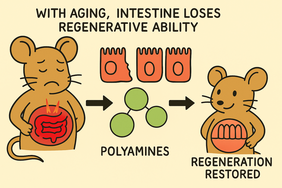Jena/Turin. The intestine is among the most regenerative tissues in the body; however, aging triggers various changes that collectively diminish its regenerative capacity.
Consequently, the intestine becomes more vulnerable to inflammation and infection, and its healing processes slow down. This often leads to digestive problems and delayed recovery after long-term medication use in older individuals. The underlying cause is the reduced ability of the intestinal epithelium to efficiently repair itself after damage. But why does the intestine lose this regenerative potential with age—and can the process be reversed?
An international team of researchers from Germany, Italy, and the US led by Dr. Alessandro Ori and Prof. Francesco Neri, former research group leaders at the Leibniz Institute on Aging – Fritz Lipmann Institute (FLI) in Jena, have investigated these questions in a study now published in Nature Cell Biology.
Aging gut out of balance
The researchers found that during the regeneration of aged mice’s small intestines, the protein homeostasis (proteostasis) balance—the fine equilibrium between protein synthesis, folding and degradation—becomes disrupted. As a result, old intestinal cells accumulate faulty, or “defective,” proteins while attempting to repair tissue damage. This accumulation triggers cellular stress, which in turn hampers the cells’ ability to regenerate effectively.
"By analyzing proteins and metabolites in intestinal tissue and conducting experiments to show how the intestine recovers after damage caused by 5-fluorouracil (a chemotherapy drug), we were able to determine that the reduced regenerative capacity of older intestinal cells is not an unavoidable effect of aging. Rather, it is directly related to a disruption in proteostasis," explains Dr. Ori.
Polyamines as the key to regeneration
A comparison of the regenerative capacity in young and old mice showed that, after damage, typical signs of proteostasis stress and elevated polyamine levels were observed only in the aged intestine. Polyamines, such as spermidine and putrescine, are small, positively charged molecules involved in many cellular processes, including both cell growth, proliferation and proteostasis regulation.
In the experiments, it was found that old mice increased polyamine levels specifically after intestinal damage, likely to improve protein homeostasis and counteract the damage that had occurred. “When polyamine metabolism is activated, for example through dietary interventions or direct oral supplementation, protein homeostasis ameliorates, and the regeneration of the intestinal epithelium is accelerated again,” report Dr. Alberto Minetti and Dr. Omid Omrani, main researchers involved in the study. “Our data suggest that the aging intestine remains capable of repair at the molecular level, it just needs the right molecular trigger to kick-start its regenerative capacity again.”
Nutrition and polyamines as a new therapeutic approach?
Particularly exciting is the finding that a short period of dietary restriction followed by two days of re-feeding, or direct polyamine supplementation, can activate polyamine metabolism prior to injury and restore regenerative capacity in aged mice. In contrast, intestinal regeneration worsened significantly when this metabolic pathway was specifically blocked.
This discovery could have far-reaching implications: polyamines, or a polyamine-rich diet, may enhance intestinal regeneration in older individuals following surgery, infection, or chemotherapy. Moreover, similar mechanisms could potentially apply to other aging tissues such as the skin or liver, opening new avenues to counteract age-related functional decline.
“We see this as a promising approach to reactivating the body's self-healing powers in old age,” explains Prof. Francesco Neri from the University of Turin. “Polyamines act as molecular regulators that help restore balance to the cell’s machinery.”
Prospects for aging research
As a next step, it will be important to carefully evaluate the safety and potential benefits of activating the polyamine pathway to enhance tissue regeneration, while also assessing possible risks such as increased cancer susceptibility. If so, targeted dietary or pharmacological polyamine interventions could help treat or even prevent age-related tissue damage in the future.
“Aging is not an irreversible process,” summarizes Dr. Ori. "If we understand how cells lose their balance – and how we can restore it – we may not be able to stop aging, but we can significantly mitigate its effects on our bodies.
Publication
Polyamines sustain epithelial regeneration in aged intestines by modulating protein homeostasis. Alberto Minetti, Omid Omrani, Christiane Brenner, Feyza Cansiz, Shinya Imada, Jonas Rösler, Saleh Khawaled, Gabriele Allies, Sven W. Meckelmann, Nadja Gebert, Ivonne Heinze, Norman Rahnis, Jing Lu, Katrin Spengler, Mahdi Rasa, Emilio Cirri, Regine Heller, Omer Yilmaz, Alpaslan Tasdogan, Francesco Neri, Alessandro Ori, Nature Cell Biology, www.nature.com/articles/s41556-025-01804-9
Contact
Dr. Kerstin Wagner
Press & Public Relations
Phone: 03641-656378, Email: presse@leibniz-fli.de









